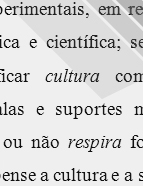

................................
However, while he endorsed the Neo-Kantian effort, particularly from Marburg, which founds modern epistemology (Wissenschaftslehre, translated into English as epistemology) by refuting panlogism and extensive and analogical scientific-natural taxonomy in the nosological field of human sciences, J. Carvalho opened up the methodological path, already paved by H. Cohen; P. Natorp and E. Cassirer, but did not theorise it. Instead, he benefitted (with Dilthey) from eideticism to clear gnosiology from scientistic explanations and clarify aporias of knowledge (Erkenntnisproblem) in the various fields of Sciences and Philosophy, testing them in the encompassing light of Weltanschauung, a "worldview" whose experience (Erlebnis) would provide the comprehensive framework (more than explanatory) of spiritual activity – which would make a coherent and consistent reading, not allowed by the mass of artistic, philosophical and scientific representations, in fragmentary chaos or in disciplinary orthodoxy. Thus, he followed the path of a history of ideas on which, with authority, he endowed the foundations and aspiration to a "science of rigour," as suggested by the example of Husserl in philosophical convergence.
This was a decisive aspect, while Carvalho probed and wrote in the full-blown century of epistemology (E. Mach, Dilthey, Meyerson, B. Russell, Brunschvicg, Bachelard, G. Canguilhem, Popper, A. Koyré, Cavaillès, Piaget, later Althusser, Kuhn, Foucault, Suppe), emerging from the dual explosion of scientific knowledge since the mid-19th century – marked by evolutionism and the theories of relativity (1905; 1916) – and the intense debates, in gnosiological and scientific theory, from monistic materialism to logical positivism, from structuralism and Marxism to Kantian restitution and the philosophies of Existenz. All this also characterised the growing interest of the social sciences, particularly humanistic and philosophical studies, in the scientific propositions and the historicity of their own foundations, concepts, and conclusions, in a long debate that symmetrised “truth” and “scientific progress,” rekindling the philosophical aporia of devenire (becoming) and human past and better stimulating historiographical studies in this interrogation.
